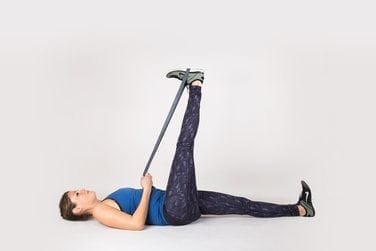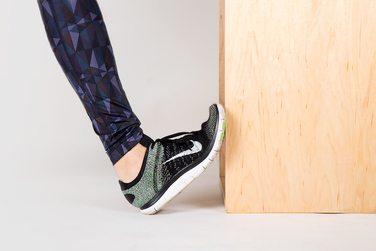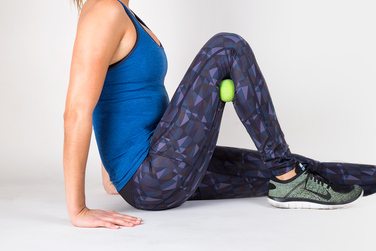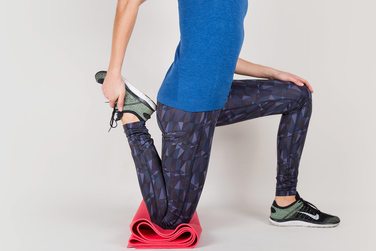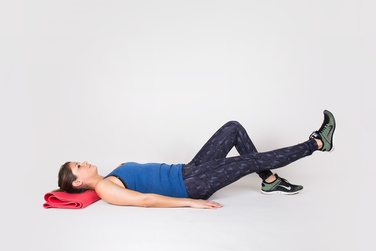Feeling weak in the knees is only a good thing when it’s over your latest Tinder date. Experiencing joint pain is an entirely different sensation—and one that’s not quite so magical.
Joint pain affects one in five Americans and is one of the leading causes of disability in the U.S. Along with leg, neck, and back pain, knee pain tops the list of problem areas, according to James Rippe, M.D., a cardiologist and joint pain specialist. And we’re not getting better: A 2013 study reported a 162 percent increase in knee replacements over the last 20 years in people 65 and older.
So how do you know if you’re at risk? Factors like inactivity, carrying too much bodyweight, poor posture, improperly treated injuries, and insufficient nourishment can all contribute to knee pain, Rippe says. Luckily, by taking better care of your knees throughout your life, starting as early as your thirties, you can strengthen joints and potentially save yourself from years of daily pain and discomfort.
What You Can Do Now
One of the best things you can do for knee health is simply maintaining an active lifestyle. “Your joints thrive on movement,” Rippe says. “Always try to remember that some activity is better than no activity.” Rippe recommends low-impact activities, like swimming, brisk walking, or cycling, and considering taking health supplements that provide glucosamine and chondroitin to strengthen and lubricate knees.
On the flip side, too much movement can be hard on your joints. So if you’re one of those people who just can’t quit their HIIT habit or long-distance runs, there are some simple moves and stretches you can try that will help alleviate pain.
Since multiple muscles overlap the knee joint—including your calf, thigh, hamstrings, quadriceps, gastrocnemius, and soleus—and work together to flex, extend, and stabilize the knee, the exact source of pain isn’t always obvious. “This means you want to think about stretching all the tissues around the knees,” says Lauren Williams, a certified personal trainer and head coach at New York City’s athletic-based training studio Tone House.
Here, Williams shares six of the best (and simplest) moves that target all those muscle groups. Try to do these stretches after every workout to keep your knees healthy now and in the future.
1. Wall Calf Stretch
Calf muscles often get neglected during our stretching efforts. However, for those who run, do high-impact workouts, or spend a lot of time on their feet, calf stretches are very necessary, Williams says. Calves can get extremely tight from impact and need to be stretched to relieve any pain that might travel up the knee.
Find a wall you can lean against. Facing the wall, flex your right foot and position your heel right where the floor meets the vertical surface. Your toes should be elevated, while your heel remains on the floor. Keeping your heel on the ground and your leg as straight as possible, lean toward your front leg, holding the stretch at its deepest point. Lean in for five seconds at a time before releasing, working to deepen the stretch. Repeat the same stretch with your left leg. Aim for 10 to 15 reps on each leg—or more, if you’re still experiencing tightness.
2. Calf Smash With Lacrosse Ball
This move allows you to work out tension in both your calf and your hamstring, Williams says.
Sit on the ground and pull your right foot close to your butt so your knee is bent. Wedge a lacrosse ball (or yoga/massage ball) below your right knee, sandwiching it between your calf and hamstring. Create a “compression force” by pulling your shin toward you, then rotate your foot in alternating circular movements to help create space in your knee joint. Continue until you feel tightness in these areas being relieved, then switch legs.
3. Half-Kneel Hip and Quad Stretch
This stretch not only feels amazing, but it also works double-duty for your hip and quad muscles, Williams explains.
Kneel on one knee (feel free to put down a towel or mat) with your other foot planted flat on the ground in front of you. Make close to a 90-degree angle with both of your legs. Lean forward toward your front leg, stretching the front of your hip downward. Next, grab the ankle of your leg planted on the ground, and pull it toward your rear for a deep hamstring and hip stretch down the front leg, all the way to your knee. Move in and out of this stretch for 10 to 15 reps or more, depending on your level of tightness.
4. Quad Foam Roller Stretch
Stretching your quads is vital, as they get adaptively short from all the sitting most of us do every day and are often under constant tension. To get this large muscle group back to functioning at its best, Williams suggests using a foam roller.
Lie facedown and with a foam roller under your right leg, right under your quad. Put the majority of your bodyweight on your leg, and roll slowly. Instead of simply rolling up and down, roll your leg from side to side too, focusing pressure on the tighter spots of your muscles. Switch legs. Continue rolling until this feeling is no longer painful. If that’s impossible (as it might be for some runners!), do it for at least five minutes.
5. Wall Hamstring Stretch
Our hamstring muscles affect the knee more than we think and can be the source of discomfort or pain.
Lie faceup with your left leg flat on the ground, foot flexed. Take your right leg and prop it up on a wall or table, or use a resistance band. This stretch should radiate down the back of your leg, beginning in your knee. Once you find the deepest point of the stretch, alternate in five-second sequences between contracting and relaxing the foot of your right leg. If you have greater flexibility, hold the ankle of your right leg and pull it toward you. Aim for 10 to 15 rounds of five-second holds, and continue if you still feel tight. Repeat with your left leg.
6. Straight-Leg Raise
Easy strengthening exercises, like leg raises, put little to no strain on your knee but also activate and strengthen quadriceps.
Lie faceup with one knee bent and the other leg the ground in front of you. Lift your straight leg up approximately one foot, rotating your leg outward (the entire leg rotates outward, so toes point on a diagonal instead of straight up to the ceiling). Do 3 sets of 10 to 15 reps, alternating legs. As you get stronger, add ankle weights up to 10 pounds.
